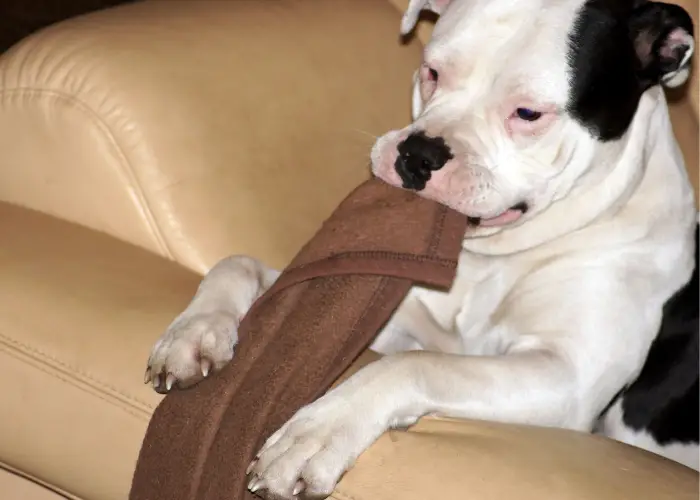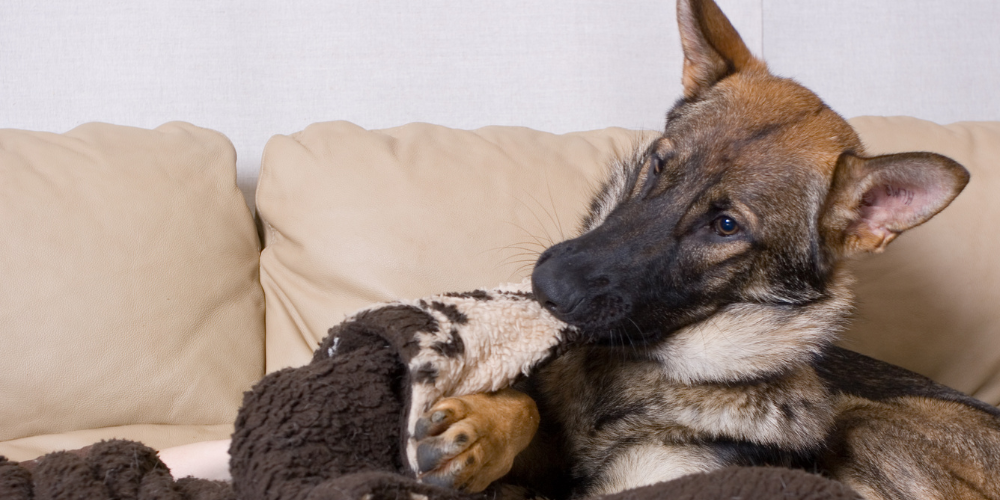Dog owners, have you noticed your pup nibbling away at blankets? It’s a peculiar yet common habit. Why do dogs nibble on blankets?
Dogs nibble blankets due to curiosity, exploring textures/smells, comfort-seeking, energy release, attention-seeking, or potential medical issues. It can be instinctual, self-soothing, or a sign of boredom/anxiety. Monitoring and understanding this behavior helps ensure their well-being.
This article reveals the surprising motivations behind this quirky behavior. Keep reading to gain insights into your dog’s blanket nibbling.
Key Takeaways
- Blanket nibbling is often a natural canine behavior stemming from curiosity, comfort-seeking, or instinct.
- Excessive blanket nibbling can be a sign of boredom, anxiety, attention-seeking, or pent up energy in dogs.
- Providing adequate exercise, playtime, chew toys and training is important to curb boredom-induced blanket nibbling.
- Working with trainers or veterinary behaviorists can help manage anxiety or compulsive blanket nibbling issues.
- Sudden excessive blanket nibbling may indicate an underlying medical problem requiring veterinary advice.
7 Reasons Dogs Nibble on Blankets

1. Exploring and Investigating
Nibbling on blankets allows dogs to explore interesting new textures, smells, and tastes.
The different fabrics and materials have their scent and feel that dogs can investigate up close with their mouth.
This provides mental stimulation for dogs and satisfies their natural curiosity and instinct to explore.
Puppies may nibble and mouth blankets as they discover the world around them. The nibbling motion helps them gather sensory information about their surroundings.
2. Self-Soothing and Comfort
The sucking or gentle nibbling motion on blankets can calm and comfort dogs.
This behavior mimics the nursing behaviors from their puppyhood when they would nuzzle against their mother and littermates for warmth and affection.
Blanket nibbling taps into these early instincts and provides security and relaxation for dogs, much like a human child sucking their thumb. The repetitive motion has a self-soothing effect.
3. Attention-Seeking
Some dogs will nibble and mouth blankets specifically to get attention from their owners.
Dogs who are bored, anxious, or want playtime and interaction may act out through blanket nibbling behaviors.
The noise and motion draw the owner’s attention. This rewards the dog for attention, petting, scolding or playtime with their owner.
4. Excess Energy
High-energy dogs may turn to blankets as an outlet for their pent-up energy. Nibbling and pulling at blankets gives these dogs a physical and mental activity to burn energy harmlessly.
It satisfies their innate need to chew and provides a constructive task for all that energy.
5. Anxiety, Stress or Compulsion
Dogs experiencing separation anxiety, fear of loud noises, or other stressors may nibble blankets as a self-soothing coping mechanism.
The repetitive, rhythmic motion has a calming effect. In some cases, blanket sucking or nibbling can become an obsessive-compulsive behavior that requires intervention from a veterinarian or animal behaviorist.
This is often seen in shelter dogs and rescues with past trauma.
6. Boredom
Lack of activity and mental stimulation can lead dogs to nibble blankets simply out of boredom.
Dogs left alone for long periods without enrichment or exercise may develop blanket nibbling habits to occupy themselves.
Not having enough toys, chews, training, or human interaction can cause this boredom-induced blanket chewing.
7. Medical Causes
In some cases, excessive or sudden onset of blanket sucking or nibbling in adult dogs may indicate an underlying medical issue. Some potential medical causes to consider include:
- Nutritional deficiencies, such as lack of sufficient vitamins, minerals, or nutrients in the dog’s diet. This can cause pica (eating non-food items) and abnormal chewing behaviors.
- Dental pain, oral injuries, or issues with the mouth, teeth, or gums that lead to chewing for relief.
- Neurological disorders like canine cognitive dysfunction, epilepsy, or nerve damage could trigger repetitive nibbling habits.
- Organ issues like liver or kidney disease cause nausea, discomfort, or odd cravings.
- Medication side effects, as some drugs like steroids may increase obsessive behaviors like blanket nibbling.
If an adult dog suddenly develops blanket nibbling habits when they did not do this before, it’s a good idea to discuss it with your veterinarian.
Blood work and a thorough exam can check for underlying physical causes like nutritional deficiencies, pain, or neurological issues.
Any changes in behavior warrant a veterinary visit to rule out health problems.
Preventing Excessive Blanket Nibbling

Tips for curbing attention-seeking or boredom-induced blanket nibbling:
- Provide adequate physical and mental stimulation through walks, playtime, chew toys, and training to prevent boredom.
- Ignore attention-seeking nibbling rather than reacting or scolding, which can reward the behavior.
- Distract with commands or appropriate chew toys when nibbling starts.
- Stick to a routine and give positive attention at set times, not for nibbling.
Recommendations for providing exercise, playtime, training, and chew toys:
- Ensure your dog gets enough activity based on age, breed, and energy level. Walks, play sessions, chew toys, training, and puzzles can engage them.
- The amount of activity needed depends on the individual dog’s needs.
Using blankets with unappealing textures or tastes:
- Try tightly woven outdoor blankets instead of soft, loose knit fabrics.
- Apply bitter anti-chew sprays to deter nibbling behaviors.
Restricting access to blankets when unsupervised:
- Keep favorite blankets picked up and out of reach when you can’t supervise directly.
- Use baby gates, crate training, or closed doors to control access to rooms with blankets.
The exact tips and level of management needed depend on the individual dog. Consulting a trainer or veterinary behaviorist can help develop a tailored plan.
When to Seek Help

While blanket nibbling is often a harmless behavior, there are instances when it might be necessary to seek professional help.
Here are some signs that blanket nibbling may be problematic or compulsive, and when to consult trainers, veterinary behaviorists, or seek medical advice.
1. Signs that blanket nibbling may be problematic or compulsive
- The nibbling is excessive, causing damage to blankets or other household items
- Your dog is unable to stop nibbling even when redirected or given alternative activities
- The behavior is causing distress or anxiety in your dog
- The nibbling is accompanied by other unusual behaviors or physical symptoms
2. Working with trainers or veterinary behaviorists for anxiety or obsessive behaviors
Suppose you suspect that your dog’s blanket nibbling is driven by anxiety or has become an obsessive-compulsive behavior. In that case, it’s a good idea to consult a certified dog trainer or veterinary behaviorist. These professionals can:
- Assess the motivation behind the behavior
- Develop a customized training and management plan
- Guide techniques like counterconditioning, environmental enrichment, and behavior modification to help curb anxiety-driven nibbling
3. Seeking medical advice if an underlying health issue is suspected
If your dog’s blanket nibbling is sudden, excessive, or accompanied by other behavioral or physical changes, it’s important to consult your veterinarian. They can:
- Perform a thorough physical examination to check for pain, nutritional deficiencies, neurological issues, or other problems
- Recommend blood work, urinalysis, or other tests to pinpoint a potential physical cause
- Adjust medications or suggest other treatments if an underlying health issue is identified
By seeking help when necessary, you can ensure that your dog’s blanket nibbling behavior is managed correctly and addressed.
Conclusion

In conclusion, most blanket nibbling in dogs is a harmless and natural behavior. However, it can become excessive and problematic in some cases.
Addressing attention-seeking or boredom-related causes is essential, and providing adequate exercise, mental stimulation, and appropriate chew toys can help manage the behavior.
It’s also important to identify and manage any underlying stress, anxiety, or medical issues contributing to the blanket nibbling.
Working with trainers and veterinary behaviorists or seeking medical advice can be crucial.
Understanding why your dog nibbles blankets is key to effectively addressing the behavior.
By gaining insights into the motivations behind this common canine habit, you can ensure your dog’s well-being and maintain a happy, healthy relationship with your furry friend.
REFERENCES:
- Flint, H. E., Atkinson, M., Lush, J., Hunt, A. B. G., & King, T. (2023). Long-lasting chews elicit positive emotional states in dogs during short periods of social isolation. Animals, 13(4), 552. https://www.ncbi.nlm.nih.gov/pmc/articles/PMC9951671/
- Overall, K. L., & Dunham, A. E. (2006). Blanket and flank sucking in Doberman Pinschers. Journal of the American Veterinary Medical Association, 229(6), 926-934. https://www.researchgate.net/publication/5972670_Blanket_and_flank_sucking_in_Doberman_Pinschers
- Onozuka, M., Fujita, M., Watanabe, K., Hirano, Y., Niwa, M., Nishiyama, K., & Saito, S. (2015). Mastication as a stress-coping behavior. BioMed Research International, 2015, 876409. https://www.ncbi.nlm.nih.gov/pmc/articles/PMC4450283/

